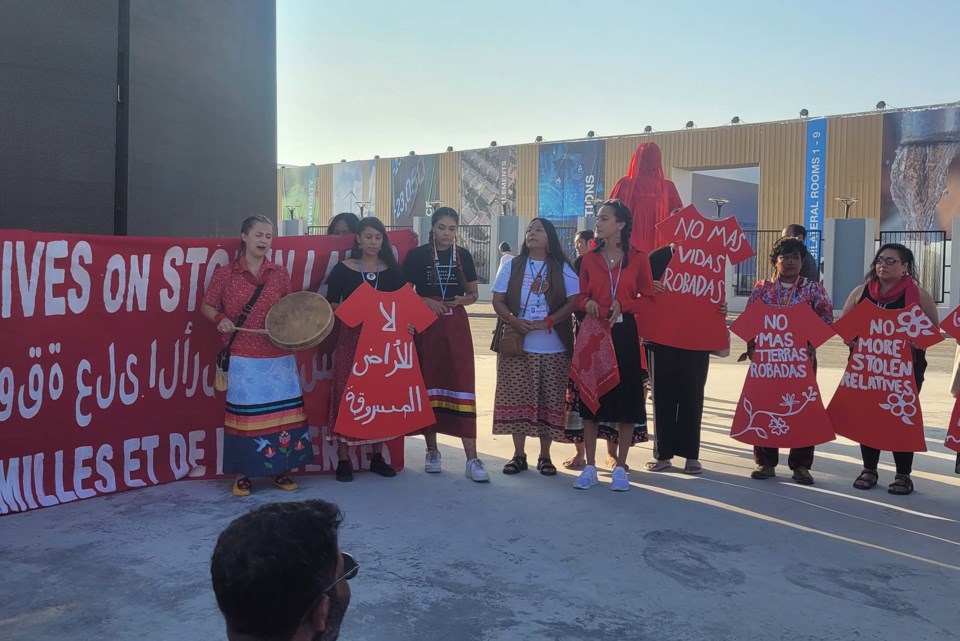A St. Albert-area woman says she sees hope for the future after representing Canada’s Métis at an international climate change conference.
Sharon Morin of St. Albert’s Michif Cultural Connections was one of the eight members of Canada’s Métis delegation at the 27th session of the Conference of the Parties of the United Nations Framework Convention on Climate Change (COP27). Held in Sharm el-Sheikh, Egypt, from Nov. 6 to 20, this conference saw thousands of leaders and other delegates from around the world meet to figure out how to address climate change.
Morin, who lives in Edmonton, said she was asked by the Métis National Council to attend the conference as part of Canada’s first official Métis delegation.
“I was the unofficial auntie,” Morin said, she was the only one older than 35.
World stage
Morin said Indigenous peoples were front-and-centre at the conference. Canadian delegates spoke on how Indigenous communities were building solar farms to get off of diesel power and partnering with researchers to track shifts in fish and huckleberry populations.
Delegates heard about how Indigenous peoples are often disproportionately affected by global heating, Morin said. One 11-year-old girl from India spoke on how her family had to move from their traditional home in the jungle to the big city due to floods and deforestation, and how they now had to grapple with polluted drinking water and heat waves.
“Indigenous people are the first ones to be affected (by climate change) because we live on the land,” Morin said, but they also have centuries of knowledge to contribute to addressing climate change.
“I believe the Indigenous peoples have a lot of the answers when it comes to our climate and how we can make it better for Mother Earth and for us.”
Morin said she was amazed at how Indigenous peoples around the world faced many of the same issues as those in Canada, often with more violence. One speaker from Brazil spoke of having family members murdered for trying to defend the rainforest, for example, while others told of Indigenous girls going missing and being murdered in labour camps. One demonstration at the conference even featured the iconic red dresses associated with the missing and murdered Indigenous women movement in Canada, with “No More Stolen Sisters” written on them in multiple languages.
Words to action
COP27 was about action on climate and getting to the net-zero targets set by the Paris Agreement by 2050, said Chris Severson-Baker, who was at the conference on behalf of the Pembina Institute.
“The big new thing at this conference was the loss and damages principal,” Severson-Baker said
Developing nations have borne the brunt of the damage from global heating despite contributing far less to it than developing ones, Severson-Baker said. (See, for example, this year’s massive floods in Pakistan.) Those nations have for many years called on rich developed countries to compensate them for these losses and damages. Leaders at COP27 agreed to do so, and would figure out the amount of compensation at a future meeting.
Canada needs to do its part to address the inequities of global heating, Morin said, when asked about the importance of the loss and damages principal.
“As our ice is melting, their waters are rising,” she said.
Alberta has made strides on climate change with its rapid phase-out of coal and commitment to address methane leaks, but has yet to make real progress on getting its oilsands sector to net-zero, Severson-Baker said.
“Alberta needs to pay attention to what’s going on, because the world is really actively working at getting off oil and gas,” he said.
Municipalities need to make every decision with an eye on the future under climate change, Severson-Baker said. That means building infrastructure to support electric cars and hardening rec-centres against extreme weather. For individuals, that means boosting home energy efficiency and supporting leaders who support climate action.
While some delegates at COP27 were disillusioned at the slow progress of the talks, Morin said she saw a lot of hope for the future amongst its many young delegates.
“You just can’t lose that hope, because if you lose that hope we lose our chance.”
Visit unfccc.int/cop27 for details on COP27.




